- Home
- Beverly Cleary
Sister of the Bride Page 7
Sister of the Bride Read online
Page 7
“They will have to take me as I am,” said her father, but he removed the eyeshade and tossed it into his rolltop desk on the sun porch. When he was not looking, Barbara closed the top of the desk.
At six thirty the doorbell rang, and Mrs. MacLane went to answer it. “Mr. and Mrs. Aldredge!” she exclaimed. “I’m so happy to meet you at last. We’ve been hearing so much about you.”
We certainly have, thought Barbara, looking over the parents of the groom while trying not to appear as if she were inspecting them. The father was a ruddy, tweedy man, who was exchanging a hearty handshake with Mr. MacLane. Lots of golf, Barbara decided, and maybe hunting and fishing, too. He did not look like a man whose nose was worn down by a grindstone to keep his children in college. She turned her attention to Greg’s mother, who was wearing a mink stole and a splashy silk print that only a very slim woman could wear. Barbara mentally summed her up as a pointed person—pointed features, pointed shoes, pointed fingernails. Barbara felt disloyal even thinking it, but Greg’s mother made her own mother look plump and a little dowdy.
“We think a lot of Greg,” Mrs. MacLane was saying. “He’s a fine boy.”
“Yes, a fine boy,” echoed Mr. MacLane. “A boy to be proud of.”
“And Rosemary is a darling girl,” said the mother of the groom. “We couldn’t be happier. The first time I met her I knew that this was the girl who was going to be my daughter-in-law.”
When the mink stole was laid on the bed and the two families were seated in the living room, there was a sudden silence that both mothers rushed to fill.
“Greg says—” began Mrs. Aldredge.
“Rosemary says—” began Mrs. MacLane. Both women stopped and laughed.
Mr. MacLane felt this conversation needed masculine guidance. He turned to Greg’s father and said, “I hear you are a baseball fan. How do you think the Giants will finish this year?”
Barbara darted a suspicious glance at her father. She thought from the remark he had made when this evening was being planned that perhaps he was trying to be funny, but apparently he was not. He was only following a well-known masculine axiom: When in doubt, bring up baseball. The two mothers exchanged sympathetic smiles.
“The odds are that they will finish second behind the Dodgers,” said Mr. Aldredge, settling comfortably back in his chair as if he and Mr. MacLane discussed baseball every night of the week, “but it seems to me that with the pitchers they’ve got and the stronger bench, they should finish either first or second.”
Mrs. MacLane excused herself to look at something in the oven. Barbara caught Mrs. Aldredge’s glance sliding from the end of the sofa, which Buster had clawed to a woolly fringe, to the carpet, and then to the lamp shades. It was a shrewd glance, as if she was assigning price tags to everything in the room. I don’t think I like her, Barbara thought suddenly.
“I’m not so sure about that,” Mr. MacLane was saying. “I think the Dodgers are a stronger all-around club, and if the hitters come through they’ll take it.”
Barbara felt that she was being immature. She should be making conversation with Greg’s mother, who must have felt that she should be talking to the sister of the bride, because she smiled at Barbara and said, “You certainly look like Rosemary. I would have known you as her sister anywhere.”
Striving to look poised and mature, Barbara returned the smile. It was always so hard to know what to say to this commonplace remark that everyone made. Her impulse was to say, Yes, but my hair is naturally curly. She dismissed this remark as lacking in maturity and answered lamely, “I guess we do look quite a bit alike.” She wished her mother would return to steer the conversation where it belonged—on the wedding.
Mr. Aldredge was saying, “I think the two new pitchers will mean eight to ten more wins, and the manager isn’t experimenting with positions the way he did last year.”
The wedding, thought Barbara, you are here to talk about the wedding. Then she had an inspiration. “Do Greg and his brother look alike?” she asked Mrs. Aldredge, hoping she sounded both mature and secure.
“Quite a bit,” answered the mother of the groom. “Bob is taller. It used to bother Greg when the boys were younger. He didn’t like being shorter than his younger brother.”
Barbara was pleased with this bit of information about the brother, who was sure to be the best man. She liked tall boys, as long as they were not as tall as Tootie Bodger.
“Well, don’t forget the wind is going to favor the home team, and that will mean another five to eight games,” Greg’s father was saying, and Barbara knew that once the men started talking about the wind at Candlestick Park, they were good for another half hour. They would have to discuss how the ballpark should never have been built where it was in the first place and all the possibilities for remodeling it. It was a conversation she had heard many times and did not want to hear again at this particular moment.
“If you will excuse me, I think I had better help my mother,” Barbara said to Mrs. Aldredge.
“Is there anything I can do to help?” Mrs. Aldredge asked.
“No, thank you,” answered Barbara.
As she left the room Mrs. Aldredge was saying, “Now Ed, don’t you think—”
“Mother,” whispered Barbara in the kitchen, “why did you let Dad get started on baseball? They’re here to talk about the wedding.”
“They’re here to get acquainted, and baseball is as good a subject as any. At least the men have that much in common.” She lifted a lid, salted something in a saucepan, and then fanned her flushed face with a pot holder. “Empty the salad greens out of the plastic bag, will you, dear? The dressing is in the refrigerator.”
When the meal was served, Gordy was produced and the two families seated. Much to Gordy’s annoyance, Mrs. Aldredge admired his red hair, which he did not like and had once threatened to dye. The conversation swung around to the occupations of the men, and Barbara waited patiently while Mr. Aldredge told how he had come out to California and had bought a luggage shop. The shop had been so profitable that he was able to expand, and now he owned shops in several towns. That takes care of Mr. Aldredge, she thought when he had finished. Now for the wedding.
But no. It was Mr. MacLane’s turn. He told how he had worked his way through college in a print shop, where “we used to hand set legals in six-point solid, thirteen picas wide.” Barbara knew this meant nothing to the Aldredges, but they were smiling gamely as if they understood everything her father was talking about. This brought her father to his favorite subject and one that he was proud of—how he had built up the high school print shop from an old-time proof press, until his students were able to handle the yearbook and all the printing for the school district. Many of the printers in the area had been his students at one time. “And now most of those kids are earning more than I do,” he concluded with pride.
Barbara forgot her impatience for a moment in her admiration for her father, who had helped a lot of boys who did not like school get a start in the world. Maybe he was a little exasperating around the house, but she loved him and she was proud of him. She sat at the table reminiscing about one of her childhood visits to her father’s print shop, when he had given her a slug, hot from the Linotype machine, with her name spelled backward. To this day she loved the smell of printer’s ink. At the moment this thought was passing through Barbara’s mind, she caught the merest flicker of a glance pass between Mrs. Aldredge and her husband. She wondered what it meant. Were they confirming something Greg had told them about her father? Something like, “He’s all right, but he does go on about that print shop of his.” Or perhaps they were impatient because her father had talked too long, when they were eager to get on with a discussion of the wedding.
Apparently so. “Won’t Rosemary make a lovely bride?” remarked Mrs. Aldredge, after Barbara had cleared away the plates and had served the dessert.
This was a difficult question for the mother of the bride to answer without sounding smug. Mrs. MacLane
managed nicely. “Rosemary and Greg will make a very attractive couple,” she said.
“That is just what I was telling Ed on the way over here,” said Mrs. Aldredge. “I said, ‘Ed, Rosemary and Greg will make one of the most attractive couples we have ever seen walk out of a church together.’”
And his brother and I will make an attractive best man and maid of honor, thought Barbara, eager to be part of the picture. The talk was desultory. Young people were so courageous these days to marry and continue their schooling. The Aldredges were willing to help Greg and Rosemary, but they refused to be helped. With such a strenuous program ahead of them, they would have to find an apartment close to the campus. The conversation was pleasant enough, but Barbara felt that the Aldredges were postponing something, that the real issue of the powwow was yet to come.
Mr. MacLane produced a cigar and extended it to Mr. Aldredge. “Care for a smoke?” he asked.
“Don’t mind if I do,” answered the father of the groom, accepting the cigar.
Barbara recognized her cue. She fetched the ashtrays without being asked.
“Has Rosemary said anything about her plans for the wedding?” inquired Mrs. Aldredge, as the two men settled back to enjoy their cigars and Mrs. MacLane served the coffee.
Mrs. MacLane smiled apologetically. “I’m afraid she hasn’t. It has all happened so suddenly, and I know she’s busy studying for midterms, so I’ve hesitated to telephone her. But she’ll be home next weekend, and I’m sure we can begin planning then. Of course it’s entirely up to Rosemary, but I thought a simple wedding, simple but pretty, you know—”
That’s what I want when I get married, thought Barbara, and instantly Bill Cunningham, riding down the hill under his black umbrella, came to mind.
“Of course it is entirely up to Rosemary,” agreed Mrs. Aldredge. “Now where did I leave my bag?”
“I’ll get it for you,” offered Barbara, even though she did not want to leave the table.
“Thank you, dear.” Mrs. Aldredge smiled. Her magenta lipstick exactly matched the print in her dress.
Barbara went into her parents’ room, where she was horrified to find Buster snoozing luxuriously on Mrs. Aldredge’s mink stole. He was not only an elegant-looking cat, he had a taste for elegance as well. “Oh, you—” She snatched him up rudely with one hand and picked up Mrs. Aldredge’s large patent leather bag with the other. She went back to the dining room by way of the kitchen, where she dumped Buster, who was uttering Siamese oaths, out the back door. She handed Mrs. Aldredge her bag and glared at Gordy.
Her brother returned her look. “What did I ever do to you?” he demanded.
“Oh, that cat of yours,” she answered impatiently. Then she thought, Oh dear, I mustn’t talk this way. The Aldredges are probably thinking, Rosemary is right. Barbara can’t seem to get along with her brother. Barbara managed to smile at Gordy. “It’s nothing, really. Forget it.” She glanced at Mrs. Aldredge, who was taking something out of her bag and apparently had not noticed that the siblings had narrowly avoided public rivalry.
“Gordy, you may be excused,” said Mrs. MacLane, and Gordy, eager to get out of his white shirt and tie, left the table.
Mrs. Aldredge produced a pack of white cards and used them to fan away the cigar smoke before she smiled and said briskly, “I’ve already made a list of our friends and relatives who will expect to be invited to the wedding. I have them all listed in alphabetical order on cards, to make it easier for Rosemary. I have put a check in the corner of the card if the person can actually be expected to come to the wedding. You will need to have some idea what to tell the caterer.”
The MacLanes stared at the stack of cards. There were over a hundred, perhaps closer to two hundred. Barbara could see that the names and addresses were neatly typed; and although she was as dismayed as she knew her mother must be at the size of the list and the mention of a caterer, she could not help admiring Mrs. Aldredge’s efficiency.
“Well…” Mrs. MacLane seemed uncertain as to what she should say. “Rosemary hasn’t actually said so, but I am quite certain she is planning a…modest wedding.”
Mrs. Aldredge dismissed this by saying, “Every girl dreams of a big wedding.” She fanned through the cards with her pointed fingers. “And for years I have been keeping a list of all the presents we have had to buy for the children’s friends—graduations, weddings, showers—you know. And then there are all our relatives, although most of them live in the East and can’t be expected to come. And some of our closest business friends. They will all be expecting invitations. Presents have cost us hundreds of dollars, and Rosemary and Greg might as well get some of it back.”
Barbara wondered uneasily what her father would have to say about this eye-for-an-eye, tooth-for-a-tooth philosophy of wedding invitations. He was sure to say something, and she hoped that, whatever it was, it would not cause Rosemary to have mother-in-law trouble the rest of her life.
Mr. MacLane blew a puff of smoke toward the ceiling before he said, “Casting your bread upon the waters, eh?”
“In a way,” agreed Mrs. Aldredge, missing the barb of the remark.
Mr. Aldredge was more astute. “Now we don’t want you to ask more people than you feel you can—handle.” He had almost said “afford.” “Maybe we could go through the list and mark those that are most important.”
“But Ed,” said Mrs. Aldredge, “Greg is our oldest child.”
“Yes, but I told you on the way over here—”
“But Ed—”
The MacLanes exchanged uneasy glances, before Mrs. MacLane leaned forward and said, “I think we should talk it over with Rosemary. After all, we can’t make any decisions until we know what she wants to do. I’m sure we can settle a lot of things this weekend, and if she really wants a big wedding, we can manage somehow.”
“Of course we should talk it over with the bride,” agreed Mrs. Aldredge graciously. She hesitated a moment before she said, “Please don’t worry about the expense. Ed and I will be more than glad to help pay for the wedding.”
Barbara felt shocked and humiliated. This must have been the meaning of the glance the Aldredges exchanged when her father had said many of his former students now earned more money than he did. This was why Mrs. Aldredge had cast an appraising look around the living room. The Aldredges thought the MacLanes could not afford to give Rosemary a nice-enough wedding for their friends to attend. They had talked it over on their way to Bayview and had agreed they should offer to help pay for it. Barbara’s hurt quickly turned to anger at Greg’s mother, sitting there at the dinner table, smiling her magenta smile. She did not like her, not one little bit. She did not like her pointed fingernails and pointed toes or her pointed looks and remarks, either.
Mrs. MacLane, whose face was flushed a becoming pink, said nothing. She was leaving the answer to this proposal to her husband. He took his time about answering. He sipped his coffee and flicked the ash off his cigar before he looked directly at Mrs. Aldredge and said, “No, thank you. That won’t be necessary. We will give Rosemary the wedding she wants.” He spoke pleasantly, almost quietly, but somehow everyone in the room knew there was nothing more to be said on the subject.
After that the two families left the table and exchanged small talk for a short time in the living room until the Aldredges began to mention the long drive home, the heavy Sunday night traffic, work the next day. “Please don’t think we are eating and running, but—”
“Dad!” exploded Barbara, when Greg’s parents had gone. “Why didn’t you tell her off? How could you just sit there and be so calm about it all? That woman insulted us!”
“What did you expect me to do?” asked her father. “Challenge her to a duel?”
Barbara smiled ruefully, realizing her father could not very well open a feud between the two families. That really would spoil the wedding. “Not a duel exactly, but maybe a polite fight,” she said.
“I think your father got his point across,” said her
mother. “There was no need to say more.”
“I figured it this way.” said Mr. MacLane. “If Greg doesn’t let his mother bother him, why should I? After all, I want to be mature, too.”
Even now her father could joke, now when the family honor had been insulted. “I can’t stand her,” stormed Barbara, “and I feel sorry for Rosemary, having her for a mother-in-law all her life.”
“I’m sure she meant well, even though her offer seems tactless to us,” said Mrs. MacLane. “And I think we should try to remember that she is Greg’s mother and that she had a lot to do with bringing him up to be the person he is.”
“I suppose so,” said Barbara grudgingly. It seemed to her that now a big wedding was necessary to save the honor of the MacLanes. I don’t care if I am being immature and insecure, she thought, and wondered how Rosemary was going to feel about her future mother-in-law’s offer.
Chapter 6
The next Saturday morning Rosemary, who had not asked Barbara to meet her at the bus station, arrived home immediately after her appointment with the orthodontist. Barbara, seeing that she was carrying only two books, knew at once that she was not planning to stay long, and was disappointed. She had counted on getting her sister alone to talk about Bill Cunningham, who had given her several rides home on his Vespa and had stopped for cookies and milk. She and Bill, with unwelcome help from Gordy, had eaten their way through a batch of snicker-doodles and were well into a batch of brownies. She felt she had to talk about Bill to someone or she would fizz over like a bottle of ginger ale that had been shaken.
“Guess what?” Rosemary burst out as soon as she stepped through the door. “I got the dentist to admit that he’ll take the bands off my teeth before the wedding!”
“For keeps?” asked Barbara.
“For keeps,” answered Rosemary. “No more grillwork, no more trips to the orthodontist, no more monthly bills!”
“I’m glad to hear it.” Mrs. MacLane laid down the coat she was at last finding time to shorten and said, “Rosemary, be sure to phone Aunt Josie and Gramma and tell them about the wedding. They’ll be hurt if they aren’t the first to hear it.” Aunt Josie was Miss Pennell, Mrs. MacLane’s older sister. She lived with her mother, Mrs. Pennell, whom the MacLanes called Gramma.

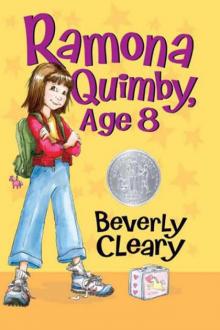 Ramona Quimby, Age 8
Ramona Quimby, Age 8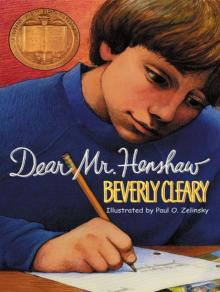 Dear Mr. Henshaw
Dear Mr. Henshaw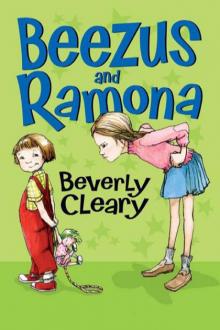 Beezus and Ramona
Beezus and Ramona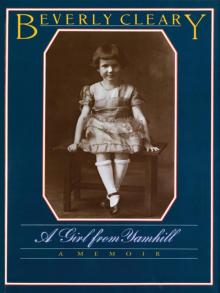 A Girl from Yamhill
A Girl from Yamhill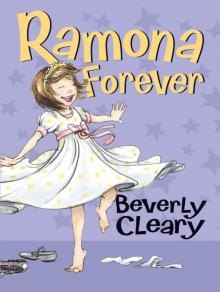 Ramona Forever
Ramona Forever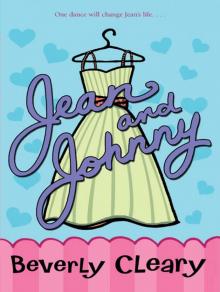 Jean and Johnny
Jean and Johnny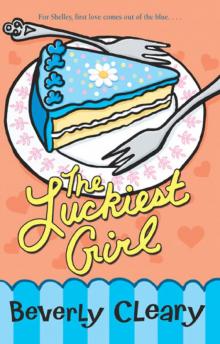 The Luckiest Girl
The Luckiest Girl Emily's Runaway Imagination
Emily's Runaway Imagination Ribsy
Ribsy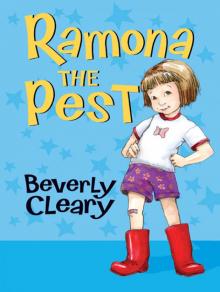 Ramona the Pest
Ramona the Pest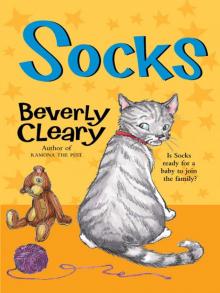 Socks
Socks Ramona's World
Ramona's World Strider
Strider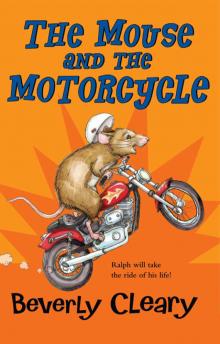 The Mouse and the Motorcycle
The Mouse and the Motorcycle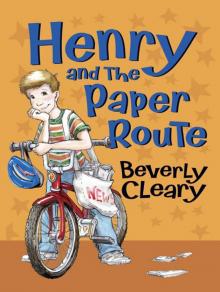 Henry and the Paper Route
Henry and the Paper Route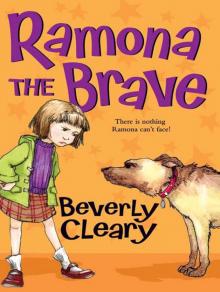 Ramona the Brave
Ramona the Brave Henry Huggins
Henry Huggins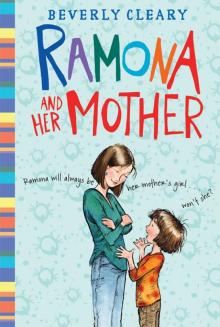 Ramona and Her Mother
Ramona and Her Mother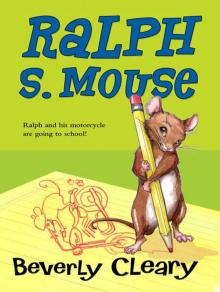 Ralph S. Mouse
Ralph S. Mouse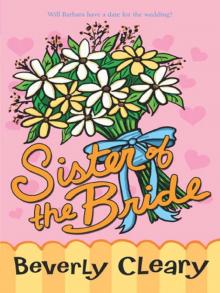 Sister of the Bride
Sister of the Bride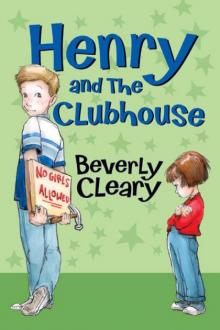 Henry and the Clubhouse
Henry and the Clubhouse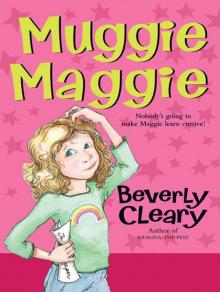 Muggie Maggie
Muggie Maggie Runaway Ralph
Runaway Ralph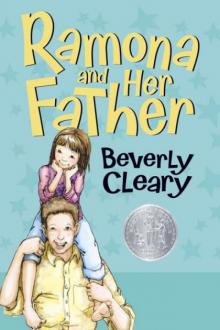 Ramona and Her Father
Ramona and Her Father Henry and Ribsy
Henry and Ribsy Henry and Beezus
Henry and Beezus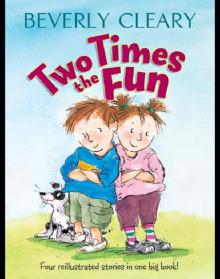 Two Times the Fun
Two Times the Fun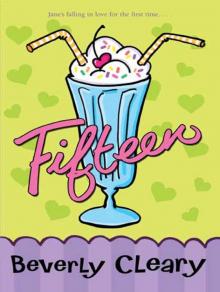 Fifteen
Fifteen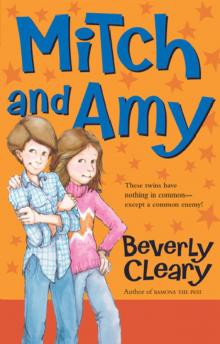 Mitch and Amy
Mitch and Amy